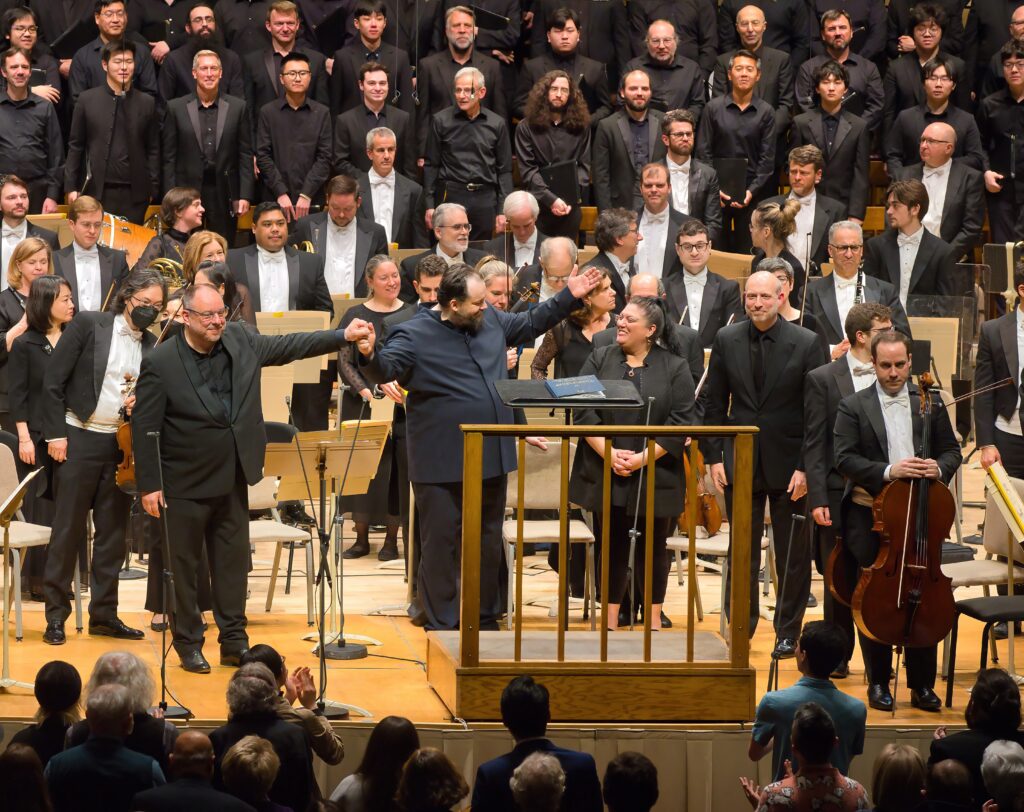Boston Symphony completes Shostakovich arc with a resounding “Babi Yar”

Bass-baritone Matthias Goerne and BSO conductor Andris Nelsons on Thursday night at Symphony Hall at the end of BSO’s eight-year survey of Shostakovich. Photo: Hilary Scott
·
All good things must come to an end. So it went for Andris Nelsons and the Boston Symphony Orchestra on Thursday night: after eight years, four Grammys, and one pandemic, their traversal of Dmitri Shostakovich’s fifteen symphonies is complete. Though originally scheduled for the BSO’s aborted 2020-21 season, one could hardly have asked for a timelier closing installment to this series than the Russian master’s Symphony No. 13, “Babi Yar.”
Premiered in 1962, the Thirteenth sets five poems by Yevgeny Yevtushenko. The eponymous first is a searing memorial to the victims of the Nazi massacre of some 100,000 Jews at a ravine outside Kiev during World War 2. It’s also a broader condemnation of anti-Semitism. The four other poems provide additional meditations on the shortcomings of authoritarian governments. All pack a moral punch, not least the central “In the Store,” which culminates in a mighty denunciation of a system that places undue hardships on women.
Throughout, Shostakovich’s music matches Yevtushenko’s texts for urgency and power. The opening “Babi Yar” is at once plaintive, haunted, and furious. “Humor” drips with sarcasm. Thundering, ominous percussion sonorities and a weirdly bracing tuba solo mark “Fears,” while the concluding “Career” boasts some of the composer’s most serenely lyrical writing.
Nearly all these qualities emerged at Symphony Hall on Thursday, with Nelsons and the BSO joined by bass-baritone Matthias Goerne and the tenors and basses of both the the Tanglewood Festival Chorus and New England Conservatory Symphonic Choir.
Goerne imbued his solos with warmth and fervor. Also, steel: “Babi Yar” rang with indignation, as did the climax of “In the Store.”
There was no shortage of character, either, in Goerne’s singing, especially in the concluding “Career.” Here, despite some fleeting balance issues, he ably mined the touches of whimsy in Shostakovich’s vocal writing, a quality that rarely emerges in this composer’s work.
Though largely relegated to a supporting role, the choirs sang with burnished resonance and rhythmic precision. They brought stentorian power to their contributions in the first movement and conspicuous élan to the tread of the patriotic-sounding refrain in “Fears.”
Nelsons presided over all of it with a sure hand. Only in “Humor” did a predilection for brassy shrillness, tentative metric shifts, and stylistic rigidity win out. Otherwise, last night’s was an admirably shaped, purposeful, and characteristic “Babi Yar.”
Much the same can be said for the performance of Benjamin Britten’s Violin Concerto that came before intermission.
Completed in 1939, the Concerto was written in the shadows of two conflicts: the Spanish Civil War and World War 2. Britten, a lifelong pacifist, further identified the solo part with the protagonist in Alban Berg’s Wozzeck, an opera about a soldier driven mad by the uncaring society around him.
Accordingly, the Violin Concerto is a marvel of melodic invention and dramatic sweep. Its lyrical first movement is followed by a whirling, diabolical Vivace. After this comes a ferocious cadenza that leads directly into a huge Passacaglia-finale.
Thursday’s soloist was Augustin Hadelich, whose command of the music – especially the cadenza and finale – was total. Playing with a tonal and expressive precision that was flawless, he delivered a reading that was fully worthy of this magnificent score.
Taking up this piece for the first time since 2012, the BSO was generally secure in their accompaniments, though spots in the central movement sounded unsteady and certain of the finale’s balances were skewed. Regardless, the orchestra’s dynamic range in the Moderato was immense; the trio for two piccolos and tuba in the Vivace gamboled; and the illumination of the Passacaglia’s structure, culminating in its shattering denouement, left little to be desired.
What’s more, Nelsons managed to tease out various of this music’s hidden details. Its debts to Prokofiev are obvious, but the second-movement anticipations of Thomas Adès are less so. What’s more, the discreet ties that bind the score to Britten’s contemporaneous (and similarly anti-war) Sinfonia da Requiem emerged subtly.
Taken together, Thursday’s was a gripping, revelatory Britten, with Hadelich, Nelsons and the BSO consistently and firmly in their collective element. Afterwards, the violinist’s encore – a probing, inward-focused and freshly embellished account of the “Sarabande” from J. S. Bach’s D-minor solo-violin Partita – placed the Britten (and Shostakovich) in a timeless context.
The program repeats Friday at 1:30 p.m. and Saturday at 8 p.m. at Symphony Hall. bso.org
Posted in Performances
